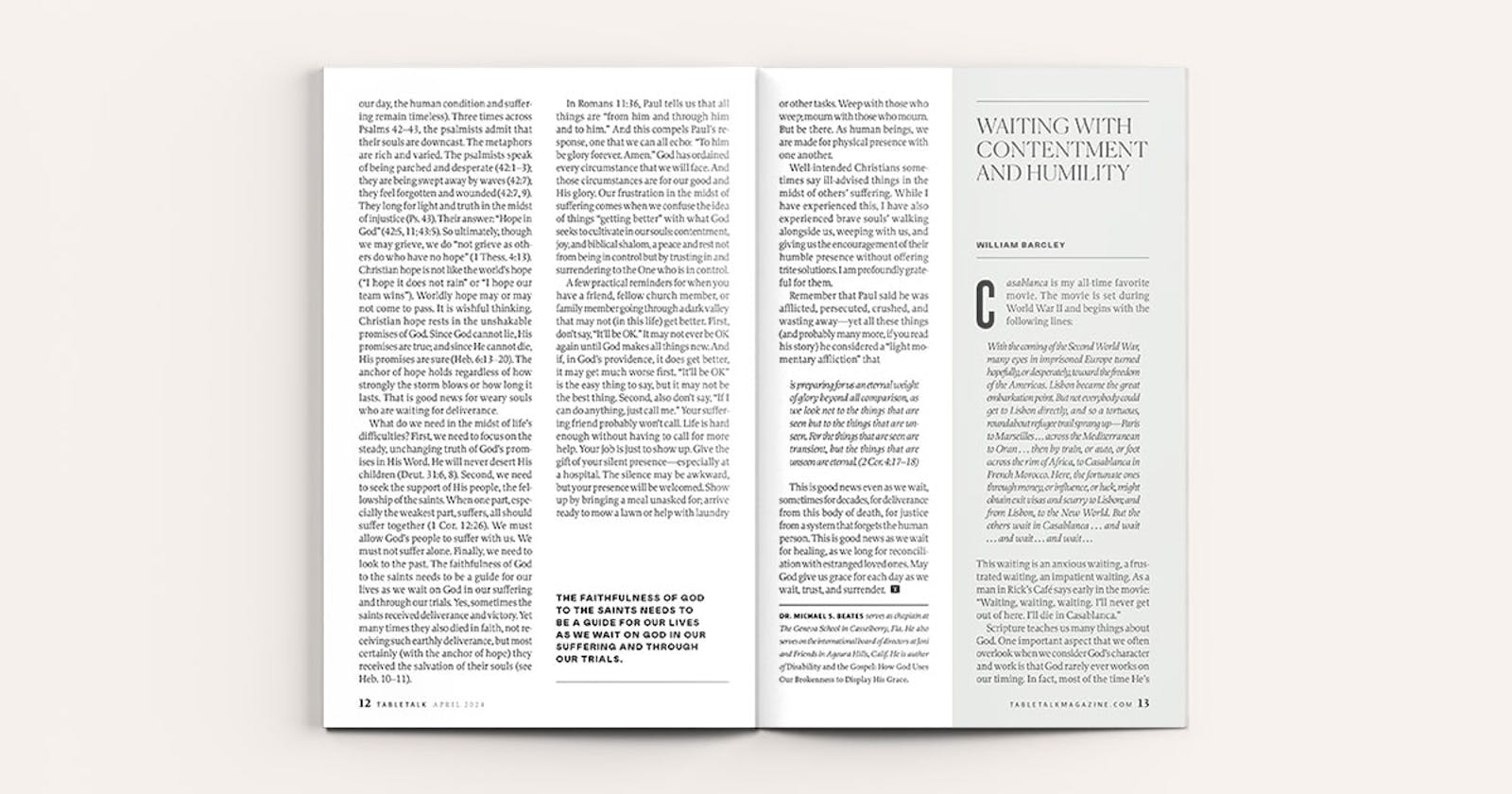
Request your free, three-month trial to Tabletalk magazine. You’ll receive the print issue monthly and gain immediate digital access to decades of archives. This trial is risk-free. No credit card required.
Try Tabletalk NowAlready receive Tabletalk magazine every month?
Verify your email address to gain unlimited access.
Casablanca is my all-time favorite movie. The movie is set during World War II and begins with the following lines:
With the coming of the Second World War, many eyes in imprisoned Europe turned hopefully, or desperately, toward the freedom of the Americas. Lisbon became the great embarkation point. But not everybody could get to Lisbon directly, and so a tortuous, roundabout refugee trail sprang up—Paris to Marseilles . . . across the Mediterranean to Oran . . . then by train, or auto, or foot across the rim of Africa, to Casablanca in French Morocco. Here, the fortunate ones through money, or influence, or luck, might obtain exit visas and scurry to Lisbon; and from Lisbon, to the New World. But the others wait in Casablanca . . . and wait . . . and wait . . . and wait . . .
This waiting is an anxious waiting, a frustrated waiting, an impatient waiting. As a man in Rick’s Café says early in the movie: “Waiting, waiting, waiting. I’ll never get out of here. I’ll die in Casablanca.”
Scripture teaches us many things about God. One important aspect that we often overlook when we consider God’s character and work is that God rarely ever works on our timing. In fact, most of the time He’s “late”—from our perspective. We do not know all the reasons for this—they can be numerous. But they include God’s desire to teach us two virtues that go hand in hand: contentment and humility.
Neither contentment nor humility comes naturally to sinful man. In fact, the first sin, the sin of Eve and Adam, essentially came down to pride and discontentment. If Adam and Eve, who were created without a sinful nature, could not live in contentment and humility, how much more difficult is it this side of the fall to have contentment and humility? Yet by the grace of God, it is possible.
We know that it is possible because the Apostle Paul wrote these words:
I have learned in whatever situation I am to be content. I know how to be brought low, and I know how to abound. In any and every circumstance, I have learned the secret of facing plenty and hunger, abundance and need. I can do all things through him who strengthens me. (Phil. 4:11–13)
This statement is startling for two reasons. The first is that Paul has learned to be content in every circumstance he faces in life, in abundance and need, in good times and bad. The second is that Paul is writing this letter while he is in prison.
The Puritan pastor Jeremiah Burroughs, in his classic work The Rare Jewel of Christian Contentment, defines contentment this way: “Christian contentment is that sweet, inward, quiet, gracious frame of spirit, which freely submits to and delights in God’s wise and fatherly disposal in every condition.” We can use this helpful definition in looking at Paul’s statement above.
First, Paul says that he has “learned” to be content in “whatever situation” he finds himself. Most of us can be content in some situations but not others. We are all familiar with those settings in which we know that we must “grin and bear it.” Sometimes that can be a bad work situation or attending a social gathering with people whom we are not particularly fond of. Paul’s situation is more difficult. He is in prison. And yet he has learned to be content.
Contentment must be learned. It does not come naturally to sinful human beings. As sinners, we are inherently discontented, even though we may put up a front that shows otherwise. Paul emphasizes this by saying twice that he has “learned” to be content, although he uses two different Greek words. The second of the two Greek words, typically translated in English Bibles as “learned the secret” or “learned the mystery,” was often used for being initiated into the so-called mystery religions of the Greco-Roman world.
Thus, Burroughs refers to “the secret of contentment.” His point is not that achieving contentment comes through some kind of secret initiation ceremony. Rather, his point is that contentment does not come according to our normal, sinful ways of thinking. The world says that if you are unhappy or in a bad situation, you must get out of it. Sometimes that is good advice, but not always. That was not an option for Paul as he wrote to the Philippians. Very often it is not a biblical or practical option in our own lives.
Furthermore, we have not learned true Christian contentment unless and until we have truly learned to be content in any and every situation that we face in life. As Paul writes, he is content when “brought low” and when he abounds, when “facing plenty and hunger, abundance and need.” Thus, as Burroughs puts it, we have attained true Christian contentment only when we learn to be content “in every condition.”
Since Paul is writing to the Philippians from prison, this is certainly not a time of abundance. During times of hardship, it is often more difficult to see what God is doing and why. Yet sometimes God gives us a glimpse. During Paul’s imprisonment, God gave him a glimpse, as well as some encouragement.

Paul was especially close to the Philippian church. He held them in his heart (1:7). He prayed for them with joy (v. 4). His letter to them was meant to encourage them. Thus, early on he writes that his imprisonment “has really served to advance the gospel” (v. 12). This happened in two ways. One, the gospel had “become known throughout the whole imperial guard and to all the rest” (v. 13). The imperial guard was a group of elite soldiers assigned to the emperor; one of their responsibilities was to guard important prisoners. The gospel had infiltrated and influenced their ranks and beyond. The gospel had reached and transformed even some in “Caesar’s household” (4:22). The second way that Paul’s imprisonment served to advance the gospel was that “most of the brothers” had been emboldened by Paul’s confinement to preach the gospel without fear (1:14).
What is Paul doing but freely submitting to and delighting in God’s wise and fatherly disposal in a very trying situation? More than that, he goes on to describe those who are proclaiming Christ out of envy and rivalry, “thinking to afflict me in my imprisonment” (vv. 15–17). Yet because Christ is proclaimed, Paul does not just grin and bear it. Rather, he says, “I rejoice” (v. 18). The “epistle of joy” would not be filled with joy without Paul’s contentment and humility.
As Paul sits in prison, he is waiting. He ponders his future and whether his imprisonment will lead to the gain of dying and being with the Lord or his release and continued ministry (vv. 19–26). But he has learned to wait with contentment and humility. He has, as Burroughs puts it, “that sweet, inward, quiet, gracious frame of spirit, which freely submits to and delights in God’s wise and fatherly disposal in every condition.” How? Only by the power of God: “I can do all things through him who strengthens me” (4:13).
Charles Simeon was pastor of Trinity Church in Cambridge, England, for fifty-four years. But the members of the church opposed him and locked the pews of the church so that for the first ten years of his ministry, those who attended worship services would have to stand or sit in the aisles or along the back of the sanctuary. Yet Simeon faithfully ministered during that time to those who came. In his biography of Simeon, H.C.G. Moule records Simeon’s thoughts on enduring his ordeal and the outcome:
In this state I saw no remedy but faith and patience. . . . It was most painful indeed to see the church, with the exception of the aisles, almost forsaken; but I thought that if God would only give a double blessing to the congregation that did attend, there would on the whole be as much good done as if the congregation were doubled and the blessing limited to only half the amount. This comforted me many, many times, when without such a reflection, I should have sunk under my burden.
Faith and patience prevailed. Simeon eventually saw his pews emancipated and his pastorate at that church blessed for forty-four more years. As Simeon recounted the precious passages that sustained him, he often quoted Lamentations 3:25: “The Lord is good to those who wait for him.”
